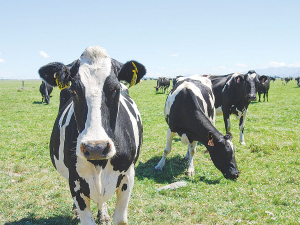South Island dairy production lifts despite stormy summer, feed risks loom
South Island dairy production is up on last year despite an unusually wet, dull and stormy summer, says DairyNZ lower South Island regional manager Jared Stockman.
 A recent study shows that animals 'personality' is distinctly linked to productivity traits in cattle.
A recent study shows that animals 'personality' is distinctly linked to productivity traits in cattle.
A recently published Journal of Dairy Science article puts forth evidence that animal personality is distinctly linked to productivity traits in cattle and farm animals in general.
In the study, carried out at Lincoln University, 87 cows were exposed twice to five different behavioural tests. Responses to novel or stressful situations were scored on a ranked scale of investigative and reactive behaviour, with most test scores being consistent over repeated tests. Behaviour test scores were subjected to a principal components analysis that revealed relationships between tests in three factors (fear of human, curiosity and reaction to milking) interpreted as personality traits.
The results were interesting, with some findings being quite expected, such as cows that are surliers and more reactive producing less milk than cows that are calm at milking. However, others were less easily predicted; less sociable beef cows often initiated herd movements to new forage sites after periods of rest.
In general, the findings showed that calmer, more curious cows spent more time grazing and less time lying down. They were also less distributed by changes to environment.
However, as an interesting exception, grain fed calves with greater avoidance of novel objects and humans reached weaning criteria earlier.
Independent of this study yet coming to similar findings, a Brazilian university study found that surly, temperamental cows were 40% less efficient at metabolising methane than calm cows leading to increased emissions per kg of milk produced.
Although the Journal article says that the testing methodology is time and space consuming, limiting the opportunity for commercial farms to use personality tests. AgResearch told Rural News that it has been testing the methodology across the country and has found that the challenges are not insurmountable.
"Running a few personality tests requires the farmer to be flexible, with one or two milkings taking longer," AgResearch senior scientist Gosia Zobel explains. "We found that test responses were consistent between testing occasions, so in theory the tests could be deployed just once a year."
She says that although cows having personalities was no surprise, the amount of variation in responses to the behavioural tests was.
While many may see this research as pointless or even comical, it may prove to have multiple uses. By breeding cattle with certain psychological traits, farmers may produce animals that provide more milk, or those with placid temperaments making them less likely to spook and increasing growth rates through lower stress.
"To actually manage animals with sentience in mind means we need a greater acceptance of the individual animal," Zobel adds. "Developing ways to work with the various differences in individual behaviour is important to moving the country forward."
The Meat Industry Association of New Zealand (MIA) today announced that Chief Executive Officer Sirma Karapeeva has resigned from the role.
The winners of the 2026 Hawke’s Bay/Wairarapa Dairy Industry Awards were announced at the annual awards dinner held at Copthorne Solway Park in Masterton on Thursday evening.
Environment Southland is welcoming this week’s decision by the Environmental Protection Authority (EPA) to approve the release of Blaptea elguetai, a leaf‑feeding beetle that will help control the highly invasive Chilean flame creeper.
This March, the potato industry is proudly celebrating International Women’s Day on 8 March alongside the International Year of the Woman Farmer, recognising the vital role women play across every part of the sector — from paddocks and packhouses to research, leadership, and innovation.
Fruit trader Seeka posted a record profit and returns to shareholders in 2025.
Recent weather events in the Bay of Plenty, Gisborne/Tairawhiti, and Canterbury have been declared a medium-scale adverse event.

OPINION: A mate of yours truly reckons rural Manawatu families are the latest to suffer under what he calls the…
OPINION: If old Winston Peters thinks building trade relations with new nations, such as India, isn't a necessary investment in…